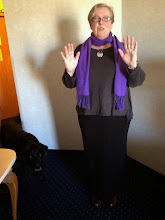My sister Jeanne is a D.O. who teaches and works in a hospital and clinic. She is a paragon of left-brain right-brain creative leadership and problem-solving in action, working at the nexus of life and death on a daily basis. She is brilliant and intuitive, technically capable and full of heart.
Yesterday's tale from the hospital:
Jeanne arrived at the hospital only to hear some muttering about a psychotic patient roaming the halls on one of the floors. "God, it must be my patient," she thinks, and sure enough, it was a patient who had been transferred to her service.
The woman was on a medication that can induce this kind of irrational behavior. She had ripped out her IV and was wandering up and down the halls yelling. The nursing staff were largely ignoring her, as she hadn't been assigned to one nurse for one on one service and therefore wasn't anyone in particular's patient, and security had gathered, waiting to move in if need be, for possible restraining and medication. There was a general atmosphere of turned heads, employed so that the patient would perhaps simply go away -- a very inefficient response, due in part to the larger issues endemic to the current US health system--i.e. profit-orientation that hasn't caught on to the profitability of sustainable organizational practices or the triple bottom line-- leading to insufficient staffing, stress and burnout, poor training and morale and an ineffectual organizational structure.
Jeanne arrived on the floor and assessed the situation. Patient wandering floors like a madwoman, possible reaction to meds, not acceptable, must mobilize staff. She called the nursing supervisor and ordered one-on-one nursing, which the supervisor balked at (not enough staff). My sister clearly repeated the medical order, clear directive, not negotiable, has to be figured out somehow. Invites the nursing supervisor to assist in solving the problem. Jeanne checks to see if anyone has called the family, which no one has. The family can't be reached, so Jeanne invites other staff into the process. New question: Is there anyone else we might call? Another nurse suggests contacting the patient's home health aide, with whom the patient has a strong relationship. Brilliant idea. They get in touch with the aide who, when she is told the situation says, "That is not like Mary!" The aide comes to the hospital, and when she approaches the patient, saying, "Hey Mary, what's going on?" Mary calms right down. They get her back into her room, back on her IV, and the restraint/medication/psych ward scenario is averted.
This takes 3 hours. And a circle of people. On not-enough sleep.
What techniques did my sister employ? Reasoned, rational assessment of the situation, and a high degree of situational awareness. She identified the questions: what resources are available, who might I engage in solving this, what is protocol, what human elements can be introduced? She employed professionalism, clarity in direction, leadership, extensive thinking (as opposed to intensive), patience, perseverance, resourcefulness, and, importantly, empathy. Would it have been easier for Jeanne to just turn her head too, order security to restrain the patient, give her a sedative and get back home for some sorely needed rest? Probably. Would this jive with protocol? Not sure, I have to ask her, but I think it may be within acceptable bounds. Would anyone want this for their own mother, aunt, sister? I think not.
Jeanne can, and does, provide this kind of leadership and creative problem-solving every day, as many health professionals do. My fear for her and for health care workers in general is that until there is a radical change in the organizational structures of the profit-based US health care system, this type of leadership (-on-a-sinking-ship) will remain a stopgap that chews up true, dedicated talent. It is simply unsustainable.
My object in living is to unite/My avocation and my vocation/As my two eyes make one in sight. -- Robert Frost
What if the mightiest word is love? -- Elizabeth Alexander
What if the mightiest word is love? -- Elizabeth Alexander
About Me

- K Douglas
- "Kathy connects with everyone and has the ability to be both involved in daily, practical matters as well as more long term strategic thinking." -- Bjorn Akselsen, design colleague
Career development professional strongly committed to supporting master's and PhD-level emerging leaders in a wide range of environment and business/environment related fields. Twelve years of progressively responsible experience in higher education, focused on career development and student services at Ivy League university.
Creative, big-picture thinker with proven follow-through and unique ability to engage and lead employers, colleagues, students and alumni to strategically improve student resources.
Empathic adviser dedicated to student success with breadth of knowledge of green, sustainability and environment-related careers.
Community leader as secretary of the board of the New Haven YMCA Youth Center--a unique youth-only Y that provides recreational and personal development programs to at-risk youth in New Haven.
Friday, June 20, 2008
Tales from A Hospital: Creative Leadership In Action; Call for Radical Organizational Change
Subscribe to:
Post Comments (Atom)



No comments:
Post a Comment